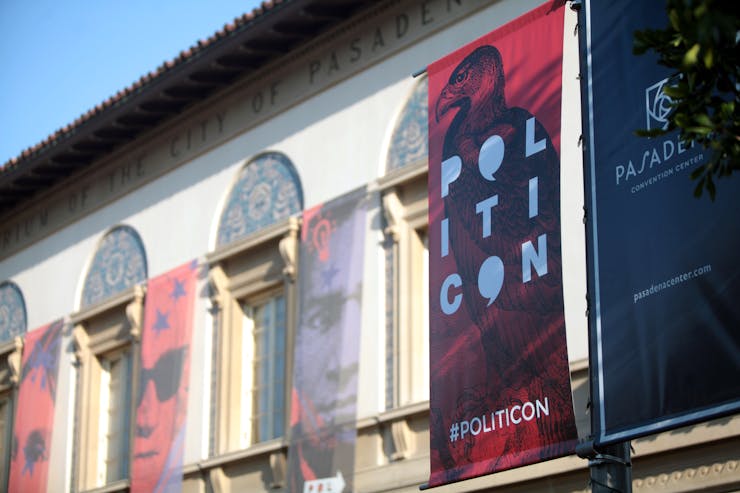In only its third year, Politicon has grown into a national “unconventional political convention,” pitting neoliberals, libertarians, Berniecrats and the alt-right head to head in panels designed to provoke, inflame and hopefully enlighten the American voter.
'If there’s any place where we can all build coalitions and get the fuck along for a while, let it be weed!'
This year’s show, held at the Pasadena Convention Center, focused on the Trump phenomenon, and many of the biggest events pitted supporters and detractors against each other (Chelsea Handler vs Tomi Lahren, Ben Shapiro vs. Cenk Uyghur). Cannabis landed on the schedule with the Weed Wars panel, hosted by VICELAND’s Krishna Andavolu and featuring Trump political advisor Roger Stone, Project SAM’s Kevin Sabet, “Daily Show” correspondent Roy Wood Jr., Civilized founder Derek Riedle, Boing Boing editor Xeni Jardin, and the ACLU’s Kellen Russoniello.

Politicon 2017 lineup (L-R): Roger Stone, Xeni Jardin, Kevin Sabet, Roy Wood Jr. (Getty photo courtesy of Politicon)
Considering the overall chaos of the political moment, most of the panel rejoiced in the bipartisan consensus amongst audience and panel alike on cannabis legalization. As Xeni Jardin put it, “If there’s any place where we can all build coalitions and get the fuck along for a while, let it be weed!”
Social Justice and Selling Out
Krishna kicked things off with a sort of theme for the panel—“the battle for the soul of weed”—as cannabis transitions from an activist subculture into an emergent industry.
The legalization advocates and the panel’s lone prohibitionist, Kevin Sabet, all claimed the social justice mantle. Sabet evoked nightmare scenarios of a well-moneyed Big Cannabis lobby attempting to seed poor communities of color with stores and cultivation centers, while people of color continue to suffer disproportionate possession arrests in legal markets.
The ACLU’s Kellen Russoniello countered this by noting the social equity components of California’s Proposition 64, as well as the city of Oakland’s mandate to award 50% of licenses to people and neighborhoods negatively affected by the war on drugs. But he acknowledged that the criminal justice advancements in legalization will be incremental rather than sweeping. “This is a fundamental shift in the way the US deals with drugs and race, primarily race,” Russoniello said. “We have yet to figure out what to do with race since before we were a country. This is an important step forward in acknowledging and repairing that bias.”
MMJ vs. Rec
The second tug-of-war took place around medical vs. adult use. Xeni Jardin, a medical cannabis patient, started off the panel with her conversion from an opponent of the “Botox and buds”-style pot shops to a grateful cancer survivor who credits weed with helping to save her life and reduce her opioid use. “Pot was the least worst drug I put in my body,” she said.
Roger Stone also revealed that he purchased cannabis for his dying father during his battle with cancer. Sabet chose not to dispute their testimonies, but told Xeni that he wouldn’t have minded if Xeni had used meth or heroin for her treatment. Xeni continually rebuked him for this as well as other false equivalencies he made throughout the panel discussion: “You can’t OD on pot. Apples are not oranges, and tobacco is not marijuana.”
While Sabet threw the most elbows, Stone clearly commanded the strongest presence as both the man with the President’s ear and Krishna’s designated “unlikeliest dude to be down with ganja.” Even Sabet refrained from challenging him on his proposed “Tricky Dick” brand cannabis line. Stone confidently predicted that “Candidate Trump’s” states-rights position on legalization would prevail administration drug warriors like Jeff Sessions.
'I am convinced that the President will do the right thing. Wait and see.'
Clearly, Stone is a busy man on this issue: He revealed that he would be serving as a witness in the recent federal lawsuit filed in the Southern District of New York, which claims that the Schedule I status of cannabis is unconstitutional. He’s also teaming up with Florida criminal justice attorney John Morgan to petition Trump himself to honor his pledge and de-schedule cannabis once and for all.
Stone’s prediction didn’t win many converts. Most of his fellow panelists were skeptical that Trump’s chaotic administrative style could bring together a disciplined and coherent position on anything, much less cannabis. Stone disagreed, pointing to a Cannabis Caucus-infused House that can easily shoulder cannabis law reform between liberal Democrats and libertarian Republicans. This calculus, he admitted, does not exist in the Senate, but he still feels “the votes can be found.” And as far as Trump goes, “I am convinced that the President will do the right thing. Wait and see.”
Not a Defining Issue
To be fair, Sabet reminded the audience that cannabis still occupies a low-priority status among most voters. Even citizens who vote in favor of legalization often fall prey to nervous NIMBYism when it comes time to implement in their own town.
Stone disagreed. “The train has left the station,” he said. The main question now, he added, is what the emerging industry should look like and who’s going to run it. Civilized founder Derek Riedle felt that ultimately cannabis will become “an economic and a global issue,” with Canada and Israel positioned to take the lead in the short run.
But at least, in case you were wondering, there was some fun to be had. Stone revealed that he joined the Libertarian Party in 2012 because he thought Republican nominee Mitt Romney was a turd, and claimed he fired Ohio Gov. John Kasich back in 1976 for selling weed. When Sabet cited a statistic claiming that most people who try cannabis don’t like it, Riedle shot back: “They’re doing it wrong.” And Daily Show correspondent Roy Wood Jr. closed the panel with a request: “I wanna come back to Politicon next year and talk about… shrooms.”





